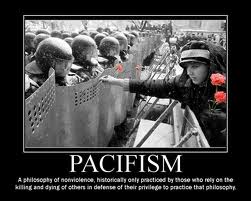(Below is the continuation of Dr. Kuruvilla’s case for non-resistance).
What about men like David who served in war?
The Old Testament is filled with men of faith who engaged in physical combat. David is but one example. Like practices of polygamy or animal sacrifice, physical war pertains to the Old Covenant but not to the New. Jesus often supersedes Old Testament practices in the Sermon on the Mount. A Christocentric, New Covenant perspective demands that Jesus’ followers obey His teaching rather than follow Old Testament examples (see chapter 8).
Didn’t Paul approve of the sword in Romans 13:1-7?
The governments of this world have been given the sword to preserve order. In Romans 13:1-7, Paul refers to the authorities in the third person (they) and to Christians in the second person (you). The different choice of pronouns for Christians and those bearing the sword is remarkable. Yes, earthly governments have been given the sword. But Paul did not use language consistent with Christians being in government or the military. In fact, in the same book, Paul affirms nonresistance (Rom. 12:19-21). Jesus also affirms that the Gentiles have their way of conducting themselves, but it shall not be so among His followers (Matt. 20:26).
Isn’t it wrong to benefit when others are sacrificing, letting them do the dirty work?
God has given the state the authority of the sword to maintain order. This is necessary in a world where so many do not follow Jesus’ new way for humanity. But if everyone were to follow Jesus’ ways, there would be no need for the sword. In fact, swords will be destroyed when Jesus’ kingdom comes in fullness (Isa. 2:4; Micah 4:3; Joel 3:10). Christians in fact render a still greater benefit to the world by proclaiming Jesus’ kingship and by inviting others to submit to His peaceful reign. While Christians should look upon the state with gratitude for maintaining order, Christians also usher in another state that has perfect order. And as described earlier, nonresistance is sacrificial, messy work that requires as much or more bravery than using physical arms.
What about Hitler? Would you have let him invade?
This question represents another example of posing a counterfactual. The counterfactual being posed is, “If Christians were nonresistant, Hitler would have won World War II and the world would be living in the nightmare of the Third Reich.” The question fails to acknowledge the tremendous Protestant and Roman Catholic support that Hitler received to gain power. Perhaps if Christians were nonresistant, Hitler would never have come to power in the first place. This would have prevented the Holocaust altogether. (Just War theorists do not pose that counterfactual and take responsibility for those deaths.) The question also minimizes the active power of nonresistance. The term nonresistance can be misunderstood: while Christians should not use weapons of the flesh to oppose evil, they are called to oppose evil through spiritual warfare, especially through prayer and preaching the gospel. “Do not be overcome by evil, but overcome evil with good” (Rom. 12:21). If there is any lesson to be gained from Old Testament wars, it is that God can intervene supernaturally and rout armies without the aid of a superior military. Finally, Christians are simply called to obedience, not to disobey Jesus’ teachings because of pragmatic forecasts of what might occur in the future. This is precisely the meaning of trust. “Some trust in chariots and some in horses, but we trust in the name of the LORD our God” (Ps. 20:7).













